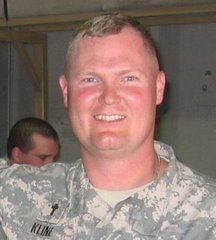 A
A good deal of hard work has gone into making this day a success for our Iraqi brothers and sisters. Our soldiers' efforts include: helping provide security at the many different polling places, supporting cooperation between the various groups laboring to draft a relevant constitution, and educating and encouraging Iraqis that their vote will help shape their future government. Whether commanders who have been supporting local leadership, young soldiers in up-armored humvs assisting Iraqi Army and police clear the roads and maintain curfews, or civil affairs soldiers distributing literature about the importance of voting--we are invested in this effort. (The picture above is of a "Free Iraq" mural that has been painted over a Saddam Hussein portrait, the likes of which were once found all over Iraq--but especially here in Tikrit: his hometown.)

Much of the time our desires for stability in this country are selfish: we want to get back home to our families as soon as possible and prefer not to return. Other times we understand that the successful completion of a mission requires that we do things right the first time, and this usually means not taking short cuts. (The picture here is of one of our K9 units searching for explosives.) As a chaplain, I interact with soldiers and leaders whose efforts are directly and indirectly tied to the stabilization of Iraq. I, myself, am largely removed. The religious and cultural diversity that defines much of Iraq is currently the source of a great deal of its frustration. (Perhaps someday its diversity will be recognized as one of its primary resources.) We serve in the Salah Ad Din province--part of the Sunni Triangle. Once part of the ruling minority, Sunnis fear marginalization from the more numerous Shia and Kurds. One of my more intriguing conversations of late concerned the upside of Iraqis voting to reject the draft constitution. This only seems possible if the Sunni turn out to vote--which, until recently, seemed like it would not be the case. Our long-term success in this country is dependent on Iraqis' sense of ownership of their government. A "no" vote may likely provide Iraqis with confidence that the democratic principle CAN work, and ultimately speed up their awareness that it is, after all, their government.

So far, the day has been quiet with Iraqis walking to polling booths--and we pray that this continues. I have no idea how long it will take to determine the results, but I pray they reflect the will of the people in this country. The great personal pride I experience in keeping my oath to protect and defend my own country's constitution makes me hope that our brothers and sisters here will soon have a similar opportunity.
 A good deal of hard work has gone into making this day a success for our Iraqi brothers and sisters. Our soldiers' efforts include: helping provide security at the many different polling places, supporting cooperation between the various groups laboring to draft a relevant constitution, and educating and encouraging Iraqis that their vote will help shape their future government. Whether commanders who have been supporting local leadership, young soldiers in up-armored humvs assisting Iraqi Army and police clear the roads and maintain curfews, or civil affairs soldiers distributing literature about the importance of voting--we are invested in this effort. (The picture above is of a "Free Iraq" mural that has been painted over a Saddam Hussein portrait, the likes of which were once found all over Iraq--but especially here in Tikrit: his hometown.)
A good deal of hard work has gone into making this day a success for our Iraqi brothers and sisters. Our soldiers' efforts include: helping provide security at the many different polling places, supporting cooperation between the various groups laboring to draft a relevant constitution, and educating and encouraging Iraqis that their vote will help shape their future government. Whether commanders who have been supporting local leadership, young soldiers in up-armored humvs assisting Iraqi Army and police clear the roads and maintain curfews, or civil affairs soldiers distributing literature about the importance of voting--we are invested in this effort. (The picture above is of a "Free Iraq" mural that has been painted over a Saddam Hussein portrait, the likes of which were once found all over Iraq--but especially here in Tikrit: his hometown.) So far, the day has been quiet with Iraqis walking to polling booths--and we pray that this continues. I have no idea how long it will take to determine the results, but I pray they reflect the will of the people in this country. The great personal pride I experience in keeping my oath to protect and defend my own country's constitution makes me hope that our brothers and sisters here will soon have a similar opportunity.
So far, the day has been quiet with Iraqis walking to polling booths--and we pray that this continues. I have no idea how long it will take to determine the results, but I pray they reflect the will of the people in this country. The great personal pride I experience in keeping my oath to protect and defend my own country's constitution makes me hope that our brothers and sisters here will soon have a similar opportunity.

No comments:
Post a Comment